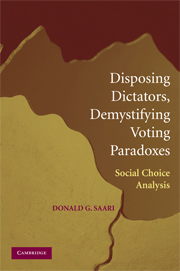1 - Subtle Complexity of Social Choice
Published online by Cambridge University Press: 24 May 2010
Summary
Does Everything Go Wrong?
Remember your last important election? Maybe it was to select the chair of a department, business unit, or social group. Maybe it was to determine who to hire, what alternative to select, which material to use in a construction project, or where to locate a new plant. Maybe it was in a presidential primary. Were you happy? It is not uncommon to be disappointed with the outcome and complain that the wrong choice won. A natural response is to dismiss such complaints as sour grapes: “Get over it already! You lost!” But surprisingly often the “wrong person” did win. The mathematical study of whether decision and election rules elect “whom the voters really want” is called social choice.
For an outsider, the area of social choice can leave the impression of a mysterious subject discouragingly consumed with disturbing voting paradoxes. These examples of voting inconsistencies, which permeate the literature, produce realistic worries about whether we might elect someone whom the voters really do not want. It is worth worrying about this fear because, in fact, surprisingly often that is precisely what happens.
Even more bothersome is the fact that this disease where societal outcomes can flaunt voters’ wishes appears to have reached the epidemic level by afflicting all conceivable voting rules. Worse news comes from the seminal Arrow's and Sen's theorems, which are introduced in Chapter 2. These theorems state that it is impossible to do what seems to be quite natural to do.
- Type
- Chapter
- Information
- Disposing Dictators, Demystifying Voting ParadoxesSocial Choice Analysis, pp. 1 - 19Publisher: Cambridge University PressPrint publication year: 2008



